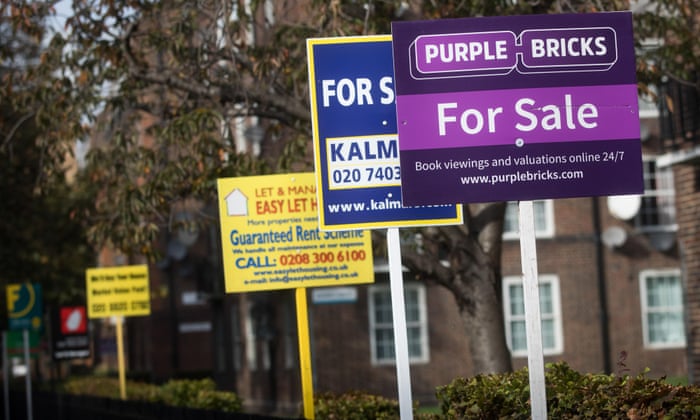
UK house price growth will slow in 2017 but the legacy of insufficient housebuilding will mean that demand will outstrip supply and lead to a 3% rise over the year, surveyors have predicted.
Although the most bullish housing market forecast for the new year released so far, the Royal Institution of Chartered Surveyors said it expected growth to be about half that in 2016. A year ago, it predicted price rises of 6% and official figures are on track to meet that, with October’s annual growth rate at 6.9%.
Rics said it expected supply issues to continue to drive prices upwards over the next 12 months. “Following on from the 2016 forecast, the supply pipeline or lack of it is at the forefront of the analysis and dominates the residential market,” it said. “While there is an improvement, the legacy of building on an insufficient scale has left the average inventory on estate agents’ books close to a historic low.”
Since June’s referendum, Rics members around the UK have reported a fall in the number of homes coming on to the market, while would-be buyers have continued to register their interest. This has been backed up by figures from mortgage lenders, which showed a 20% fall in the number of loans to home movers in October.
Rics said the number of sales was set to fall slightly from 2016’s figure, from about 1.25m to between 1.15m and 1.2m, reflecting a downwards trend over recent months.
The organisation said it expected East Anglia to have price rises above the national average, alongside the north-west of England and the West Midlands. Separate figures from the property website Zoopla showed that the east of England had seen prices rise by 12% in 2016, with the Norfolk town of Diss recording the biggest increase over the year. The West Midlands was the second-placed in its rankings, with growth of almost 9%.
Prices in central London look set to stabilise after recent falls, Rics said, with the weak pound encouraging foreign buyers into the market. Meanwhile, across the UK rents are forecast to increase by between 2% and 3% and Rics said that they could rise more quickly than house prices over the next five years. In London, it said growth would be more modest in 2017, predicting rents could flatline or rise by up to 1% over the year.
The Rics chief economist, Simon Rubinsohn, said: “Although recent announcements by the government on housing are very welcome, the ongoing shortfall of stock across much of the sales and lettings markets is set to continue to underpin prices and rents. As a result, the affordability challenge will remain very much to the fore for many.
“Meanwhile, the lack of existing inventory in the market is impacting the ability of households to move and will contribute toward transaction activity over the whole of 2017 being a little lower that in the year just ending.”
Many of the biggest players in the property industry have now published their forecasts for 2017. Property firm Savills has suggested that prices will remain flatacross the UK, and fall in the north of England, Wales and Scotland. In the east of England it expects 2.5% growth. On Monday, the UK’s largest building society, Nationwide, said it expected the UK average price to increase by 2% over the year, below the rate of growth it has reported in 2016. It had forecast growth between 4% and 6% this year, and at the end of November said year-on-year growth had slowed to 4.4%.
Robert Gardner, Nationwide’s chief economist, said: “Like most forecasters, including the Bank of England, we expect the UK economy to slow modestly next year, which is likely to result in less robust labour market conditions and modestly slower house price growth.
“But we continue to think a small gain (around 2%) is more likely than a decline over 2017 as a whole, since low interest rates are expected to help underpin demand while a shortage of homes on the market will continue to provide support for house prices.”
The government is due to publish its long-awaited housing white paper in January, which will address the shortfall in supply in all types of homes, including rental properties and social housing. The Rics head of policy, Jeremy Blackburn, said this would be a “defining moment”. He said: “Whilst the system based on large, private housing developers and homes for owner occupation has increased house building, it’s not delivering. The UK needs a coordinated strategy for building across tenures, using all of the delivery and technology mechanisms at our disposal.”
Gardner said: “The major housebuilders appear to have capacity to expand output, with most reporting land banks that could support around five years’ worth of construction at current rates of building activity. However, there is a risk that the uncertain economic outlook may weigh on activity in the period ahead.”
[Source:- theguardian]
